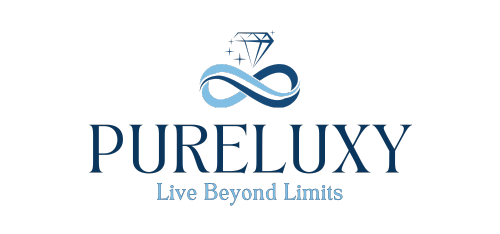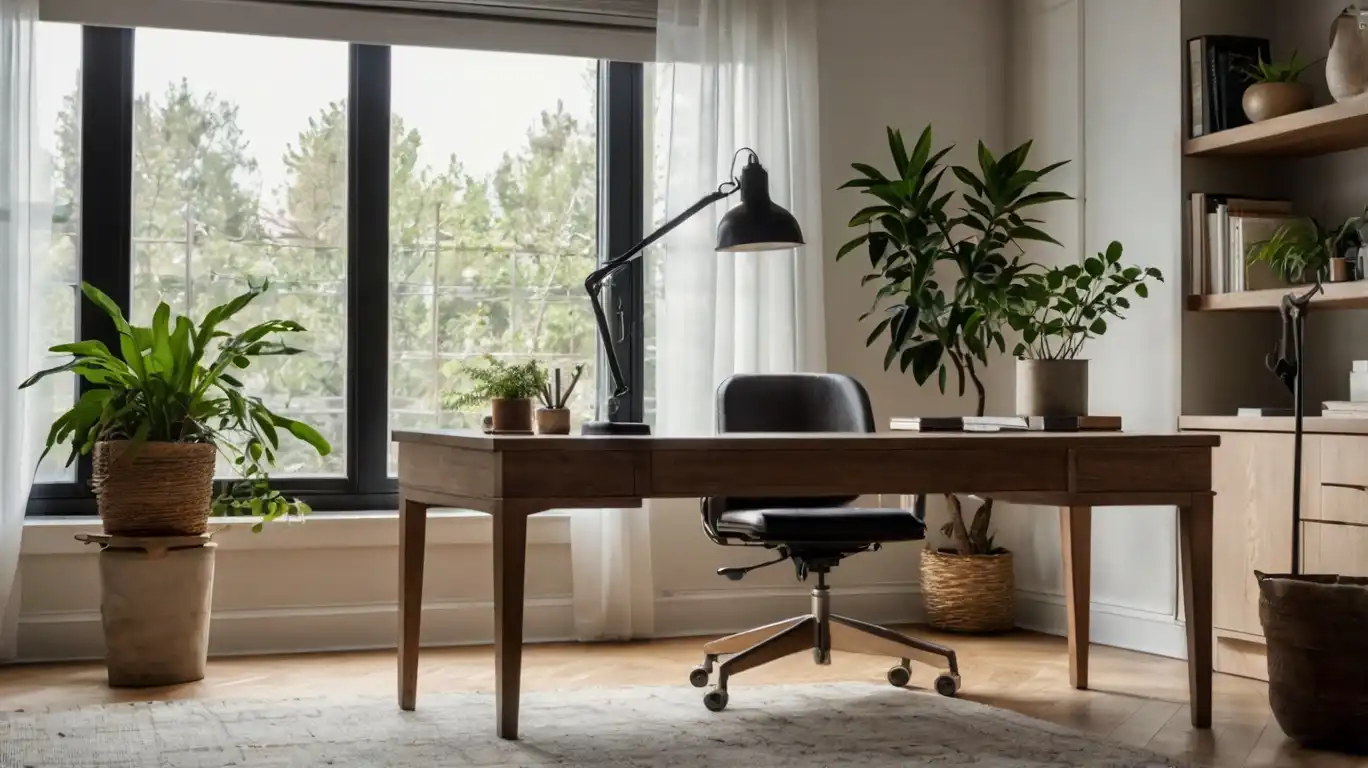In this fast-moving world, people are looking for creative and easy solutions to boost productivity and reduce stress, especially at work. The rage to find simplicity in the chaos around us has turned inward to our homes, and home office design has embraced the minimalist trend as a proven solution in forming an environment that balances simplicity, utility, and a soothing aesthetic.
One of the great advantages of this Lifestyle switch is the possibility to eliminate distraction. In doing so, they can create a cleaner, more clear environment that promotes focus and enables them to work more efficiently.
Table of Contents
The Benefits of Minimalist home office design
Additionally, Minimalist Modern Home Office aesthetics help create a calming atmosphere that promotes a healthy mind. Nothing but order and cleanliness in the workspace can change mood to a great extent.
Research that has been done from the official side shows that cognitive processing is much clearer in an environment to which there is little to no clutter, which results in better quality and efficient work.
Furthermore, minimal home office helps enhance overall well-being by soothing feelings of overwhelm, which are often fostered by having too many items or distractions around.
Owning less means dealing with less ownership, resulting in greater freedom that naturally leads to lower stress levels. Minimalism does not just mean keeping your space clutter-free; it involves creating a lifestyle to promote clarity and purpose.
This way of being and acting allows people to focus on the tasks at hand, which results in better concentration and higher productivity.
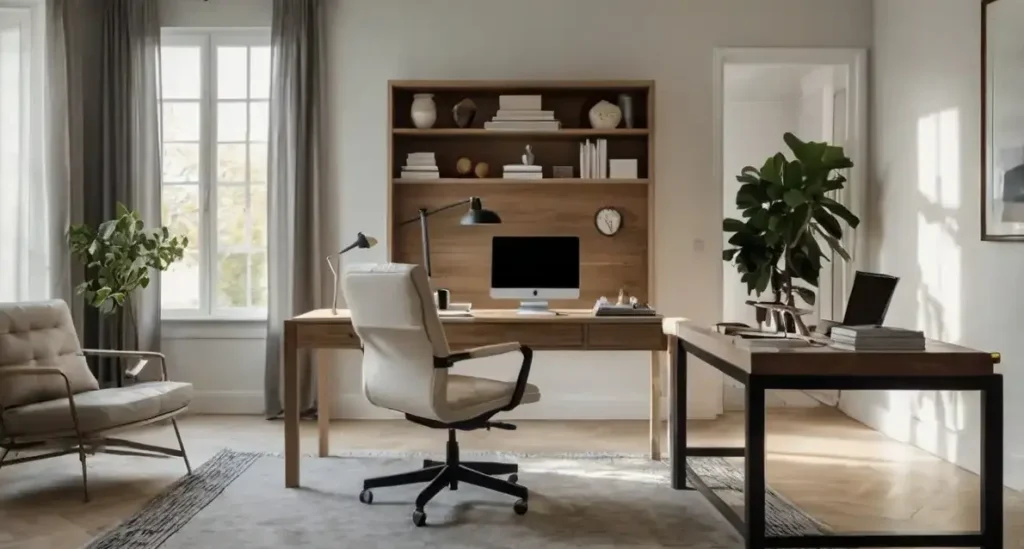
Productivity and Minimalism
Nevertheless, the minimalist home office design plays a very crucial role in productivity. Decluttering lets you create a space that not only looks good but is also very efficient.
Focused on efficient use of space and resources, the design enables a more holistic approach to work, incorporating elements that assist both productivity and well-being.
Principles of Minimalist Office Design
- Minimalist design stemmed from a philosophy of simplification, functionality and the elimination of things that did not add value to the object being created.
- Minimalism is a way of life, not just a visual style; its focus on clarity and purpose applies to every piece of a space.
- Minimalism is that each piece of furniture & décor has a purpose yet adds to a beautiful space.
- Minimalism is characterized by a commitment to essentialism, clean lines, and a decluttered workspace.
Benefits of Minimalist Office Design
Minimalist office design comes with several benefits. One of the reasons is it helps you to have more clarity and focus by reducing distractions. Work space should be neat and clean so that one can work easily without a lot of things on your desk.
The second aspect is minimalism can make you more productive. When distraction is less, works can be performed effectively, leading to increased output. And a minimalist office reduces your stress levels, as a clean space will help make for a calmer mind.
Common Misconceptions about Minimalism
While there are many good points, there are also common misconceptions about minimalism. One myth is that a minimalist office has to lack personality and warmth.
In fact, there could be a clean approach that would just subtly enhance the personal element and identify in terms of space design. Another misconception is that minimalism means being poor, but it is not about quantity, it’s about quality.
It is important to choose strong, resilient pieces rather than more affordable, low-quality items. To practice minimalism is to curate your space, so that every piece has purpose and significance.
First Steps in Creating a minimalist home office design
It all starts with planning to set up a minimalist home office design so that it will be functional and tailored to your needs.
Step 1 — Evaluate Your Tasks
Think about whether you need a specific place to do creative work, handle administrative tasks, or hold virtual meetings, and what the must-have tools and materials are to support your work. This initial assessment will inform your choices of layout, furniture, and decor.
Step 2 — Choose an Appropriate Location
Then you must decide for an appropriate location inside your home. Of course, this space should facilitate focus and productivity with as few distractions as possible. Things to consider: how much natural light is available, where the noise levels are, how close it will be to communal places to live. Having a quieter area or an entire room set aside specifically for your work aids in keeping a clean line between work and personal space, allowing you to be much more efficient as a result.
Step 3 — Decluttering
Decluttering is one of the core principles you should follow when creating a minimalist home office design. Before adding new elements, make sure to clear away anything that doesn’t help you to be productive or feel calm.
That includes older furniture, antiquated technology, and spare office supplies. By reducing clutter, you establish a peaceful atmosphere that encourages innovation and focus.
Step 4 — Aesthetic Considerations
When decluttering is finished, it is time to work on the aesthetic of your office. Redesign your office space with a minimal color palette that inspires calmness and productivity.
Soft neutrals or calming shades effectively set a warm tone for an inviting feel, visually organizing the space.
Also include ergonomic furniture elements that follow the principles of minimalism and do not make the room feel crowded.
Crucial to reaching the minimalist aesthetic while maintaining utility are multi-tasking pieces, like a desk with storage built into it.

Key Components of Minimalist Home Office Design
Building a minimalist home office design also means that you carefully pick what elements are the most essential to you to get the job done while keeping things aesthetically clean.
Essential Furniture
At the core of this design is selecting a desk and chair that will provide comfort without sacrificing any of the style.
A desk with clean lines and ample surface area keeps things organized, and an ergonomic chair promotes good posture and allows you to be productive for longer periods of time.
In selecting these pieces, opt for those that adhere to a minimalist ethos (wood or metal pieces, for example, will meld into the overall design).
Effective Storage Solutions
Apart from choosing furniture, one of the most important aspects of maintaining a clutter-free environment has to do with effective storage solutions.
Select cabinets or shelves that minimize visual clutter but still provide sufficient storage for key documents and office supplies.
Vertical space can be used with floating shelves that not only serve a functional purpose but can also allow for decorative features that add to the visual appeal and complement a minimalist theme, but not overwhelm the space. To maintain efficient organization, storage options are best that are out of the way yet accessible.
Layout Considerations
For minimalist home office design, layout is everything. This well-structured layout maximizes the use of available space and encourages a productive environment.
For example, think about how you will move within the room, keeping items you will use often within reach while avoiding cluttering the space.
Flexing common space for collaboration and complementing it with private zones for deep work can strike that balance.
Enhancing Aesthetic Appeal
Placing plants or artwork in a mindful way can enhance the area even more while still working within your minimalist lifestyle by using pieces that naturally promote calmness and provide inspiration.
By merging the right proportions of these main components, you can create an organized and working minimalist home office.

Minimalist Style Decor and Accessories
Forming a minimalist home office design means choosing decor and accessories carefully and according to the philosophy of ‘less is more.’ In a minimalist space, each item should have a purpose and contribute to a harmonious atmosphere.
Choosing Artwork and Wall Decor
The first thing to do is to pick beautiful, subtle yet meaningful artwork and wall decor. If you’re going for simpler abstract pieces, or monochrome prints, they can be visually interesting without being overwhelming. It keeps personal expression within bounds instead of cluttering the workspace.
Utilizing Mirrors
Add mirrors to the decor: Another useful technique is using mirrors. Mirrors help create an illusion of space and depth, so a small home office seems less claustrophobic and more spacious. Placing a big mirror opposite a window can take advantage of natural light by reflecting it back, further brightening the space.
Selecting Lighting Fixtures
Also, look at the selection of light fixtures. Lighting that is minimalistic in design yet functional and beautiful in form. Choosing narrow pendant lights or stylish floor lamps provides sufficient lighting while enhancing the design without being overwhelming.
Importance of Natural Light
The impact of natural light in creating a comfortable and inspiring workspace cannot be overstated! Just being able to maximize this resource can have a big effect on mood and productivity.
It is also important to position the desk near the windows to capture the daylight. Sheer curtains are one way to soften the light from outside while still maintaining openness. This balance creates an inviting atmosphere – a place where one can concentrate and be creative.
Adding Greenery
Adding greenery is another great way to introduce natural-focused beauty and improve wellness, but keep only a handful of low-maintenance plants moving in the direction of a clean and simple ideal.
Achieving Minimalism
If you think smart plans and work to inspire simplicity in your ambience and functionality rather than adding unnecessary decor here and accessories there, a minimalist office is all you need! The well-placed artwork, the mirrors, the lights, and natural elements turn an office into a peaceful spot for work.
Injecting Greenery and Natural Elements
This is why, there are benefits in bringing in plants to a minimalist home office design, to enhance the experience and make working more worthwhile, while having such an environment.
Plants provide aesthetic value, but also facilitate calmness and harmony which is important in a workplace environment. Tree had previously been aware for example to enhance air quality and as a consequence create a healthier atmosphere and enhance productivity.
Worked into minimalist design, studies show that natural elements in an office setting reduce stress and enhance mood, a valuable addition to any home office design.
Benefits of Plants in a minimalist home office design
Opt for low-maintenance indoor varieties when choosing plants for a minimalist home office. Look for snake plants, pothos or ZZ plants, which need little water and care.
They adapt to low light, making them perfect for less sunny spaces. Ferns and peace lilies also add a touch of lushness without requiring constant attention, combining beauty with utility.
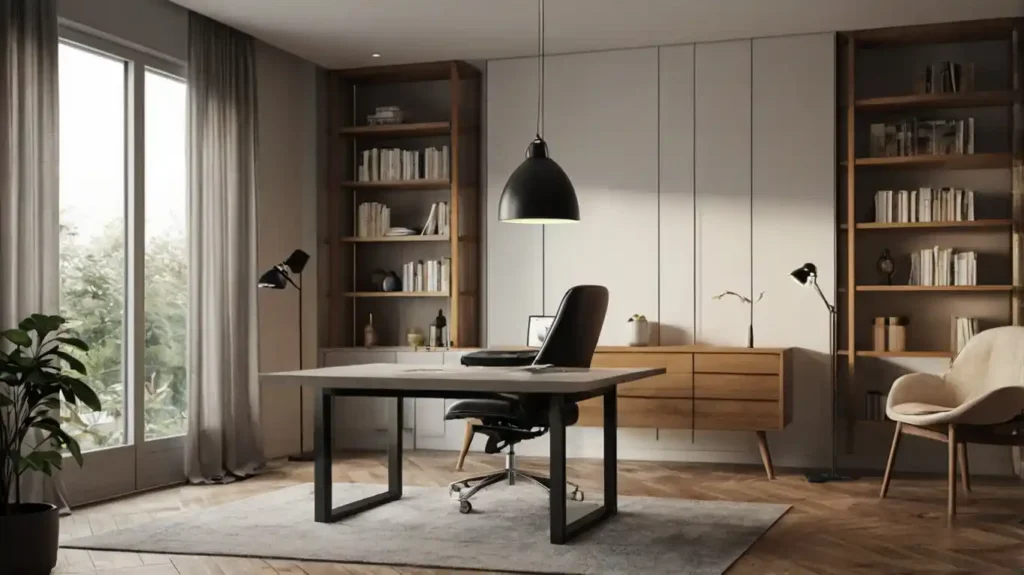
Aesthetic Considerations
Selecting the appropriate pots and planters is equally important to a minimalist aesthetic. Choose simple one-colour designs in materials such as ceramic or concrete to keep the space cohesive.
The sleek modern pots help the plants shine in the space without too much clutter or distraction. Hanging planters can also add an interesting visual dimension in addition to taking up no desk space — so ideal if your home office is on the small side.
The Role of Technology in Minimalism
Technology plays an integral role in increasing productivity in today’s workspace, especially in a minimalist home office design. The less-is-more philosophy would be that technology on balance should help you to minimize distractions and redundancies in your life or business.
Cable Management
Cable management is one of the crucial aspects to be optimized. A mess of cables can ruin an organized, calm workspace.
Cable organizers, in the shape of clips or sleeves, may ensure a tidy aesthetic while keeping devices easy to reach.
And wall-mounted power strips not only keep your desk area clear of clutter (which you want in a minimalist setup), but they can save desk space as well.
Sleek Gadgets
Include sleek and modern gadgets that align with minimalism principles. An example of this is a wireless keyboard and mouse, which can eliminate the visual distraction that is cables and create a clean look.
This leads to an uncluttered workspace, especially with laptops that do not feature a lot of design elements and have relatively small dimensions.
This is why picking tech that adjusts to your minimalist home office design is crucial, as the color palette of all the devices should match the general aesthetic of your space.
Surfaces in neutral tones or monochromatic designs can brighten up a space and create a calming workspace.
Digital Decluttering
Digital decluttering is an important part of minimalism too. Just like our physical environment, our digital space gets littered as we accumulate files, emails, and applications.
Organizing digital assets regularly, deleting unwanted files, and unsubscribing from irrelevant emails can go a long way towards minimizing distractions.
This is easily handled via file management solutions, like cloud storage, so you can still access necessary documents without the mess.
With strategic cable management, up-to-date gadgets, and a clean digital space, a minimalist home office can be a harmonious space that promotes productivity and tranquility.
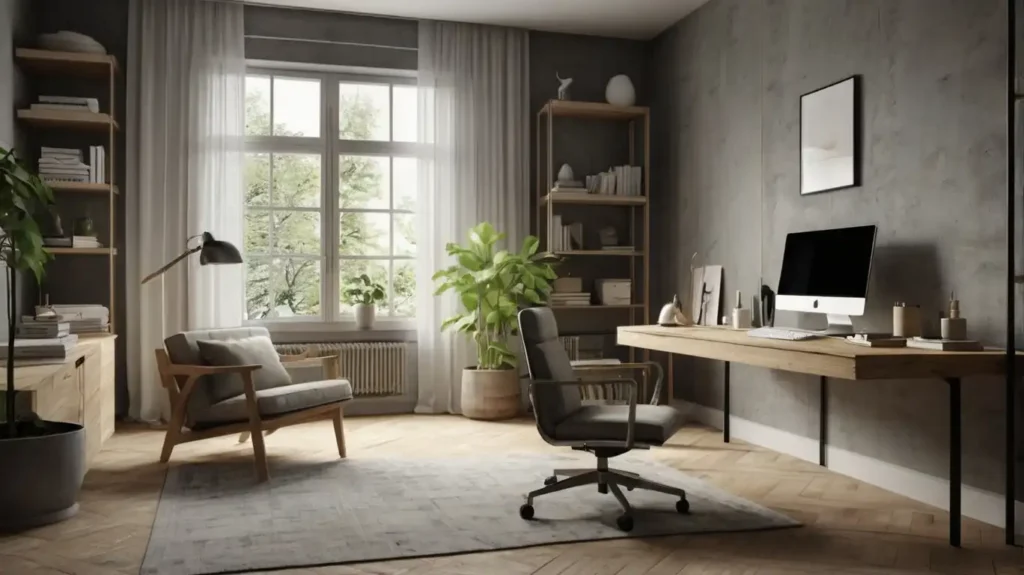
How to Keep Your Minimalist Home Office
With only one workspace, planning your environment well is key to being productive and creative. In order to do this, you need to establish daily habits that keep things organized, clean, and tidy.
Dedicate some time at the beginning of each day to organize your workspace. That could mean organizing away paperwork that people no longer require or ensuring all devices are neatly organized.
Creating a schedule for this upkeep will make sure you get the discipline you need to keep your office clean.
Importance of Periodic Decluttering
While daily maintenance is important, periodic decluttering is critical. Schedule time maybe once a month or quarter to re-evaluate what items are still in your home office.
This assessment will help you to recognize any things you have accumulated over the years that seem unwarranted.
Eliminate things that are no longer useful, are obsolete, or do not reflect your current work goals. These decluttering sessions will make your workspace more functional, as well as bring a new zest and focus to what needs to be done.
Adapting to Changing Needs
Also, as your work requirements change, so will your flexible home office. That might involve investing in new tools or desk accessories that better suit your changing needs.
Choose multi-functional furniture or storage solutions that retain the minimalist look while providing more functionality.
A desk with integrated storage, for example, can keep things out but—out of sight—aiding the minimalist effort.
If you take the time to periodically assess and adjust your workspace, it will serve as a constant source of inspiration while being void of distractions and tailored to your changing career landscape.
Minimal Office Ideas on a Budget
You do not have to spend a ton of money to create a minimalist home office design. And in reality, many affordable options are available that may make it possible for you to achieve an elegant and practical work environment without sacrificing your bank balance.
The trick you need to keep up to date with is prioritizing your spending and making decisions you actually get the minimalist regularly without making you spend needlessly.
Furniture Considerations
Begin by considering the furniture items you will use. Keep it simple; a nice desk and comfy chair is where your priority should be.
Second-hand or refurbished items from local thrift stores or online marketplaces can also significantly reduce any spending.
Seek out multipurpose furniture, like a desk with built-in storage or a chair that can serve as a guest seat.
It is not only the most cost-effective solution but also perfectly in line with the minimalist philosophy of functionality and simplicity.
Decor Choices
In terms of decor, pick a couple of solid pieces that speak to your style — not too many decor pieces everywhere.
Wall art that motivates you or a couple strategically positioned plants can bring your minimalist workplace back to life without exhausting it.
Also, craft your own decor pieces with inexpensive materials to reinforce the one-of-a-kind character of your residence, all while keeping costs at a minimum.
Decluttering for Efficiency
Another key point of minimalism is decluttering. What do you need for an efficient work environment, and how can you do it cost-effectively? Get rid of and give away anything that no longer serves you, then feng shui your belongings.
Simply use inexpensive storage options such as open shelving or desk organizers to ensure your workspace remains organized and aesthetically satisfying.
Smart Spending Tips
Finally, just make sure that you are smart spending. Spend money in areas that balance impact and cost — investing in good stationery or a long-lasting desk.
Using these inexpensive tips, you will create a minimalist home office that best fits your tastes and your control of your money.
Inspirational Ideas for Minimalist Home Workspaces
Designing a minimalist home office is an enjoyable project that helps boost concentration and productivity at work. Look at these and use the inspiration to create your dream domain.
The true mark of minimalism is the removal of clutter and an effective organisation of space — something that is often at the core of simple yet functional designs. Many people are adopting minimalist values and ideas to create beautiful yet functional workspaces.
Global Trends in Minimalist Home Offices
People around the world are setting up stunning minimalist offices in their homes. For example, a Scandinavian-inspired office aesthetic uses natural materials and neutral tones to emphasize simplicity while also providing comfort.
This design approach generally relies on sleekly designed furniture lines, for example, a light wood desk and a minimalist chair.
The look is complemented with carefully curated accessories, sometimes reduced to just a single potted plant or the essential desk lamp to add a splash of color and life.
Celebrity Inspirations
Celebrities often share their own versions of stripped-down offices. Mark Zuckerberg and Ellen DeGeneres, for example, have both prioritized simplicity in their home offices with streamlined desks and a neutral color palette.
These well-publicized instances remind us that actually, effective design doesn’t have to be complex. They advocate for the notion that a clean house can help bring clarity to your mind.
Additional Insights
Current date: Thursday, January 09, 2025, 10 AM +01
Key Principles of Minimalist Design
- Simplicity: Focus on removing unnecessary elements.
- Functionality: Ensure every aspect serves a purpose.
- Clutter-free Spaces: Maintain organized work areas.
- Neutral Color Palette: Use subdued tones for a calm atmosphere.
- Natural Light: Embrace open spaces for visual appeal and connectivity.
Tips for Creating Your Minimalist Workspace
- Choosing the Right Location: Preferably spacious and well-lit.
- Choosing the Right Colors: Opt for soothing whites, grays, and beiges.
- Choosing the Right Material: Wooden furniture enhances natural aesthetics.
- Choosing the Right Desk: Go for simple designs with adequate space.
- Choosing the Right Chair: Ergonomic chairs support posture and productivity.
- Clean and Bright Environment: Maximize natural light for freshness.
Exploring Global Styles of Design
And finally, when we are looking into Global styles of design it’d be worth your time to explore the Japanese “Wabi-Sabi” and how you can use that in your designs.
This approach celebrates imperfection and simplicity, opening the door to the use of natural materials and understated textures that can give personality to minimalist spaces.
Integrating this aspect can result in home offices that are quirky yet organized, providing an inviting area that promotes inspiration and concentration.
Creative DIY Projects That Add a Personal Touch
Minimalist Home Office Ideas
Creating a minimalist home office is an exciting chance to make your workspace your own while still keeping to its true nature of simplicity and function. And DIY projects are an excellent way to do this.
Customized Minimalistic Decor
A good place to begin is designing customized minimalistic decor to match your office type. Make a few wall-mount shelves out of reclaimed wood.
Not only does this provide much-needed storage, but it can also display a select few decorative elements or plants that require little maintenance, tying together the overall minimalist vibe.
If you have items you may already have at home, another sustainable approach is to upcycle them. A retro suitcase can double as a statement storage piece or a farm-style side table to add interest to your work from home scene.
Old mason jars can also be used as attractive pencil holders or small succulent planters, enhancing a tidy look. (These upcycling projects help divert waste from landfills and add touches of nostalgia and personalization to your office space.)
Unique Organizational Components
Creating one-of-a-kind organizational components makes this task easier to achieve, giving you all the function you need while still adhering to minimalist ideals.
Make a pegboard wall organizer where you can keep important office supplies organized and easily reachable. If you want both an eye-catching and functional piece, you could also paint the pegboard in a soothing color that matches the color palette of your office.
A modular desk organizer can be designed so that you can decide how you want to structure your workspace, even without the conversation can be changed over time when your needs change that makes the organization last long.
DIY Projects for Your Minimalist Office
These are four ways you can implement DIY projects in your minimalist office and create a work environment that meets your personal style without sacrificing purpose and function. In fact, all of these intentional improvements promote a more fruitful and positive workspace.
Find On-Point Office Design Tips On Minimalism
It needs to be both aesthetic and functional while designing a minimalist office. Experts in design know how to balance these two aspects to create an efficient workspace.
Overloading the area and other decor waste is against minimalism, and one of the biggest mistakes one can ever make. Instead, just choose a couple of must-haves that have a specific purpose in mind.
Choose multifunctional furniture, such as an office storage desk, to save space while keeping things looking tidy.
Effective Use of Colour
Effective use of colour is another core pillar of creation for minimalist office design. Neutral palettes (think whites, greys and beiges) foster a sense of calm and openness. A few small accents in bolder tones can add visual interest without overstimulating the senses.
Maximizing Natural Light
Another aspect to keep in mind is how much natural light your office space has. The use of mirrors, windows, and sheer window treatments maximizes daylight, which further enhances the atmosphere and enables a more productive environment.
Decluttering Strategies
Also, make sure to declutter efficiently. Create a workspace organization routine that includes regular decluttering sessions.
When you make this a habit, it keeps your minimalist office organized, which is essential for staying on task. Wall-mounted shelves and hidden compartments can also help to keep your space organized and minimalist-friendly.
Personalization
Designers suggest customizing your workspace with a few select items that match your style — perhaps one work of art or a plant. That personalization gives it character while still respecting the minimalist ethos.
Adopting the less-is-more concept, and with these expert recommendations, you can create a functional but beautiful minimalist home office that boosts productivity and satisfaction.
Leaving you with a conclusion: from chaos to calm
The concept of minimalism is making its way to the world of home office design these days, but for very specific reasons. This allows you to shift your brain from a cluttered workspace to a clean and creative space, conducive to calming mindsets.
With the thoughtful items you have in your home office, you remove distractions and elements that may take you away from the focus and productivity you need. This methodically decreases the visual noise in your environment and makes it much less cluttered.
Creating a Peaceful Environment
For one, a minimalist home office promotes a peaceful environment. Creating a sanctuary that enhances focus and creativity is made possible by prioritizing indispensable things and eliminating extraneous belongings.
Furniture or decor should serve a purpose, promoting the idea that simple is more efficient. In the end, this well-thought-out intentional design choice can provide your workspace with functionality that serves your professional needs while also serving to facilitate your mental and emotional well-being.
Enhancing Productivity Through Minimalism
Embracing minimalism in your home office can also lead to better productivity. Research has proven that a less cluttered surrounding environment leads to less stress and better concentration.
Fostering creativity while maintaining an environment conducive for working long hours can be achieved through a minimalist approach.
This new movement is significantly positive as, in modern times of remote working becoming more prevalent than ever before, constructing an effective workstation that improves the work and life quality has become paramount.
A Testament to Focus on What Matters Most
A minimalist home office, then, is a testament to your dedication to focus on what matters most. Not only do you better prepare yourself to do your best work, but you also create an environment conducive to your greater health.
If you familiarize yourself with this concept, simplicity can open the door that leads to performing at your best, in the most peaceful and productive environment.

